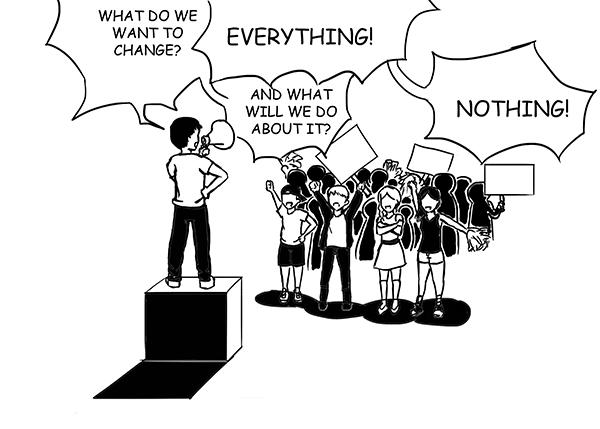It is uncommon to find a group of students discussing whether to attend the next board meeting or debating over which local politician to support. Teens underestimate the importance of being politically active, often to their own detriment.
This apathy toward political affairs is understandable – teen life involves a taxing workload, especially in the pressurized environment of Palo Alto, and even local politics can seem far-removed, as if it has little impact on us. However, we overlook just how much local politics does control or change our lives, especially because politicians implement policies that students sometimes disagree with.
The school board is made up of six adults, who are not all educators, in charge of making decisions that will impact thousands of students. Yet, students rarely, if ever, let them know their opinions.
We can’t complain about school policy if we never care enough to give input in the first place. If the school board is left guessing in the dark, grasping for a way to help students without any feedback, it is difficult for district administrators to come up with solutions that work. One student representative on the school board does not provide enough of the teen voice — as the Gunn schedule change has shown, there is strength in numbers.
Students ought to take advantage of the variety of ways to get involved by attending board meetings, writing to local politicians, joining youth organizations or simply starting a conversation with those who have the authority to make the desired changes.
This obligation goes both ways. While we, the students, have a duty to remain involved in politics that affect us, the adults, those on the school board or in positions of authority, also have an obligation to listen to what we have to say, to take action and not dictate the conversation simply because they know better. Of everyone who speaks before the school board, only the school teachers, administrators and students truly know what happens at the schools. Yes, students need to speak up more. But when students speak up and their opinions are not acknowledged, as when Gunn students spoke out against the abolition of zero-period academic classes and the school board was not fully receptive, we become disillusioned. If it seems as if we are shouting into empty space, it’s only reasonable that eventually we become quiet.
To encourage student input and create a better dialogue between the district and the student population that it serves, students need to be politically active and adults need to be receptive to our words and actions, so that our community acknowledges the opinions of all.

